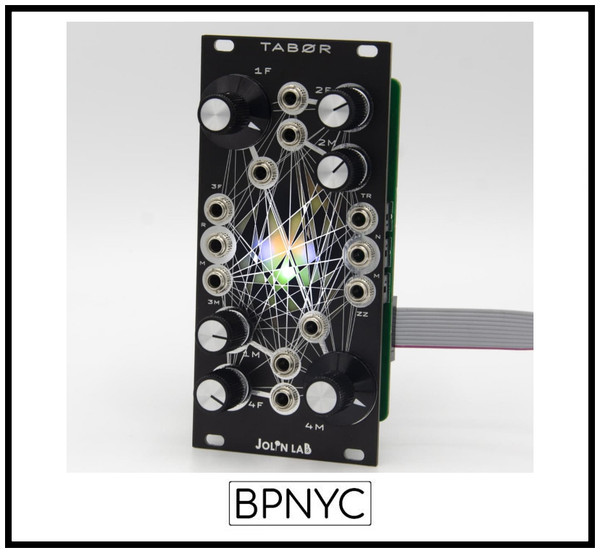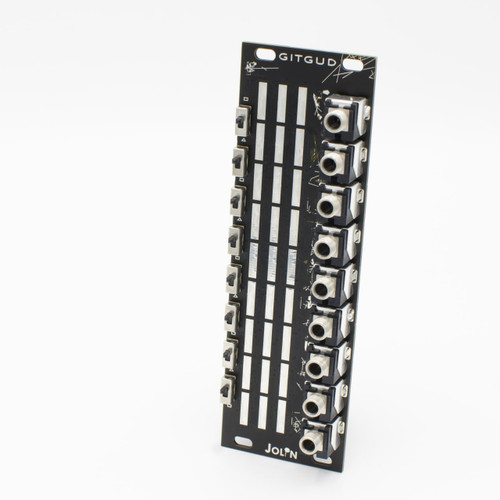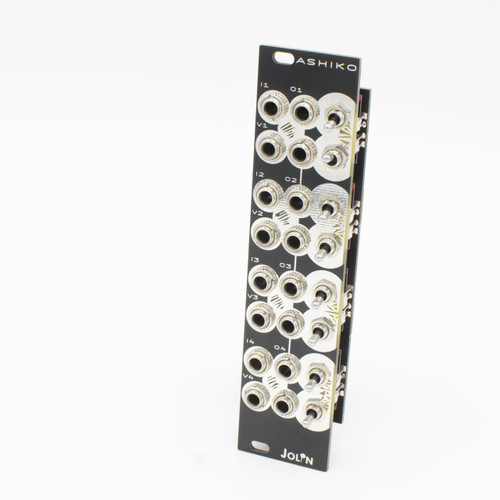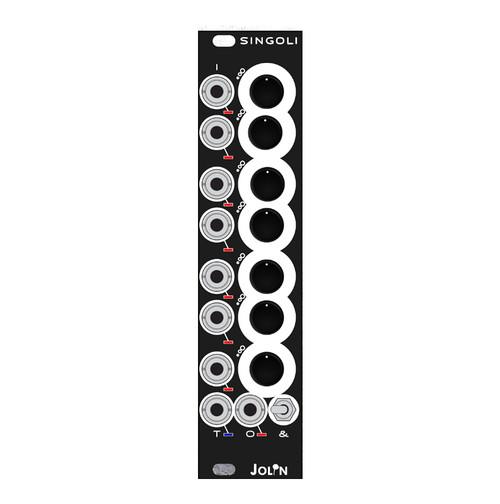Product Overview
TABØR is a rhythmic analogue sound and CV source based on the unpredictability of four avalanche transistors in a continuous oscillation state.
These unpredictable core oscillators are related to each other and their charge and discharge cycle creates complex rhythmic sound textures that can be controlled and triggered with external CV inputs to add more contamination.
With this circuit we can obtain rhythmic textures- intended as rise pulses – and different tone heights by mixing the colors of the LEDs and the values of the capacitors. The waveform of a single oscillator, unfiltered, is basically a sawtooth. The result of the FM modulation of the whole sound engine is chaotic.
Features
Four avalanche oscillators with two controls each:
F: regulates the distance between the spikes of the single sawtooth waves - their rise pulses frequency
M: the amount of cross-modulation of each core within the others
Each oscillator can be identified thanks to its color and it can acts differently depending on the state of the others:
OSC1: the most percussive and predominant, the fundamental modulator
OSC2: obedient to OSC1 rhythmically and its direct subsidiary - a carrier
OSC3: strictly related to OSC2 but can set-aside OSC1 as a modulator
Due to its autonomy from the fundamental OSC1 and to keep the communication balanced, OSC3 doesn't have the F and M control potentiometers. Its values can be changed only with external CV input
OSC4: it can act as a shutter to filter or interrupt the whole communication
these variables can all be controlled individually with vactrol CV inputs
Visually you can see the "beating" oscillators in the hollow circle in the middle of the module.
To start oscillate and communicate the sound engine needs around 16v to 22v and any value below that point will stop hierarchically its operation:
RM: this input act as an attenuator to the oscillators, limiting their power supply
A dummy cable will shut down the oscillators due to the inverted-vactrol configuration of this input. The RM input can be used as an internal voltage-controlled-attenuator, a VCA
The result of the whole sound engine is given in three different outputs:
TR: a “squarified” always positive 0-7v trigger / cv source
This output is not always active, it fires triggers when the avalanche engine reaches a certain threshold: blue LEDs blinking
NM: the dry mixed audio signal straight out of the oscillators
ZZ: an auxiliary fuzzed envelope output from the internal diode-based distortion circuit
- 12 HP
- 29 mm deep (Through-hole Full Kit 45mm)
- 65 mA +12V
- 7 mA -12V
- 0 mA 5V
Product Videos
Videos Hide Videos Show Videos
-

mz2250 - 3 patches with Tabør
In-depth article and complete Patch diagrams: https://mz2250....
-

Patch Log - EP_004: Jolin Lab TABØR [no input]
The three outputs TR, NM, and ZZ are going to a Sisters filter...
-

TABØR Analogue Eurorack Rhythmic Oscillator - Part One: Raw Waves
Tabør walk-through: part one - Raw Waves In this patch Tabør...
-

TABØR Analogue Eurorack Rhythmic Oscillator - Part Two: Rhythm It
Tabør walk-through: part two - Rhythm It In this patch Tabør ...
-

TABØR Analogue Eurorack Rhythmic Oscillator - Part Three: Q./A.
Tabør walk-through: part three - Q./A. Does it track 1v/oct? ...
-

Meet Tabor by jolin lab
I had the pleasure to try out an eary prototype versione of Ta...
-

Tabor study: gritty bass & rhythm
In this video I try to explore a bit of the fresh new module f...


















